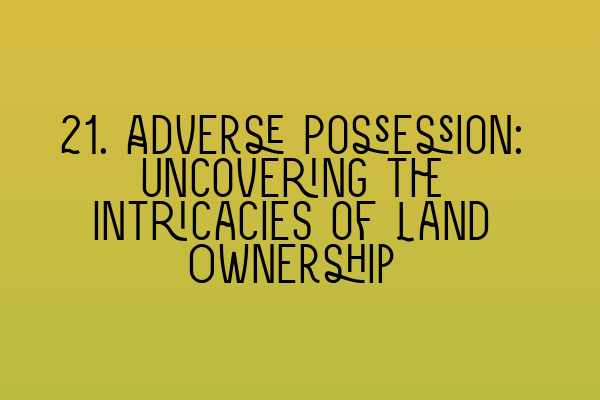21. Adverse Possession: Uncovering the Intricacies of Land Ownership
At SQE Property Law & Land Law, we pride ourselves on providing our clients with comprehensive legal advice concerning various aspects of property law. In this blog post, we delve into the fascinating world of adverse possession, shedding light on its intricacies and shedding light on how it can impact land ownership.
What is adverse possession, you may ask? Adverse possession refers to the legal principle by which a person can claim ownership of someone else’s property by occupying and using it for a specific period of time. This concept, also known as squatter’s rights, can have significant implications for property owners and potential buyers.
Understanding the Basics
Adverse possession is primarily governed by the Land Registration Act 2002 in England and Wales. According to this act, an individual can acquire legal ownership of land if they can demonstrate:
- Actual Possession: The claimant must possess the land and treat it as their own. This possession must be exclusive and continuous for a specific period.
- Open and Notorious Possession: The claimant’s possession of the land must be obvious and visible to anyone who conducts a reasonable inspection.
- Hostile Possession: The claimant must possess the land without the owner’s consent. This means that the possession must be against the rights of the true owner.
- Continuous Possession: The claimant must occupy and use the land continuously for a specified time, usually ranging from 10 to 12 years. It is crucial to note that this period may vary depending on the specific circumstances.
It is important to consult a qualified solicitor to understand and meet these requirements effectively to make a successful claim for adverse possession.
The Implications of Adverse Possession
Adverse possession can have various implications for both the current landowner and potential buyers. For the current owner, it can result in the loss of legal title to their property if a successful claim is made. This means that they may be forced to surrender their property to the claimant who has successfully met the requirements of adverse possession.
If you are considering purchasing a property, it is crucial to conduct thorough due diligence to ensure that there are no adverse possession claims against the property. This may involve engaging the services of a professional conveyancer or solicitor who can carry out detailed searches to identify any potential risks.
Additionally, adverse possession can also impact future transactions involving the property. Prospective buyers may be deterred from purchasing a property with a history of adverse possession claims, as it can create uncertainty and potential legal challenges. This highlights the importance of seeking legal advice and conducting thorough research before investing in a property.
Consulting a Professional
Given the complexities and potential implications of adverse possession, it is crucial to seek expert legal advice to navigate through the process successfully. At SQE Property Law & Land Law, our team of experienced solicitors specializes in property law and can provide you with practical guidance to protect your interests.
If you require assistance with adverse possession or any other property law matter, please do not hesitate to get in touch with us. Our qualified solicitors are here to assist you every step of the way.
Related Articles:
